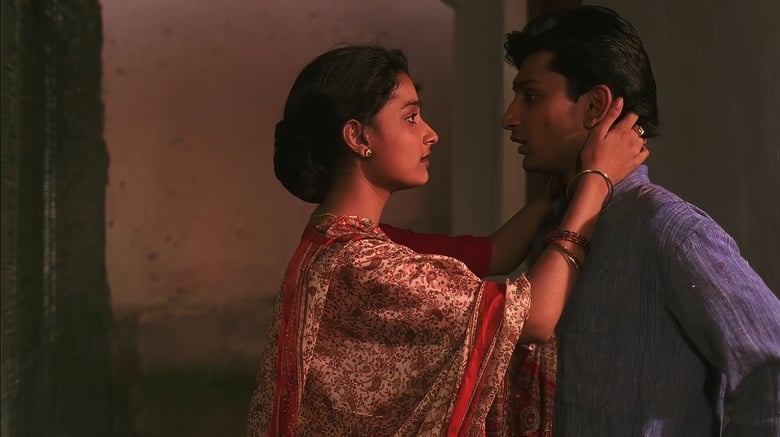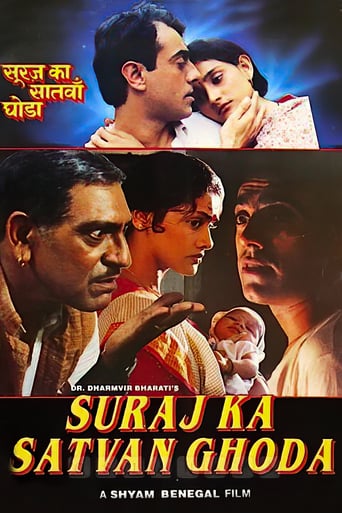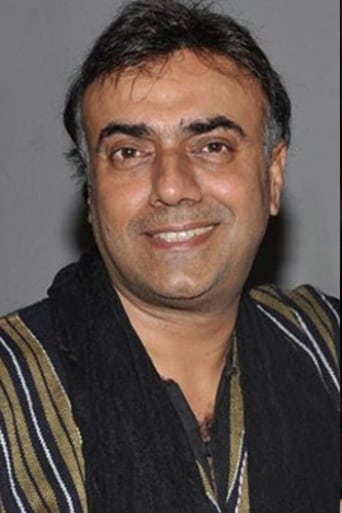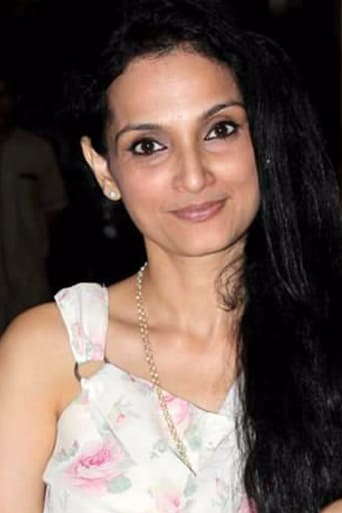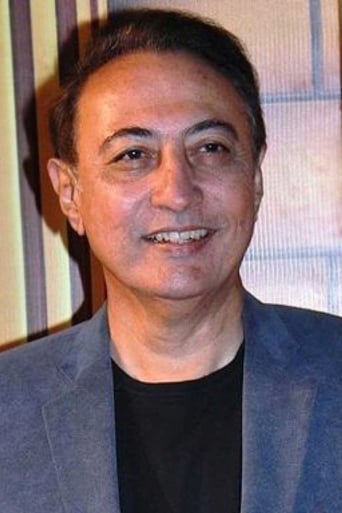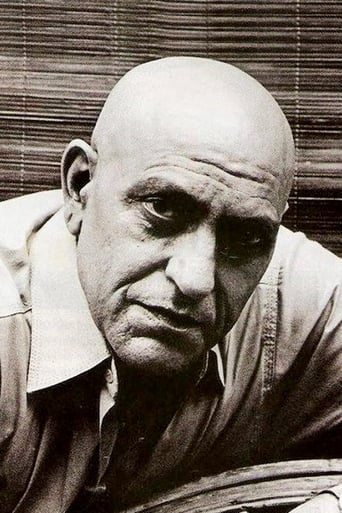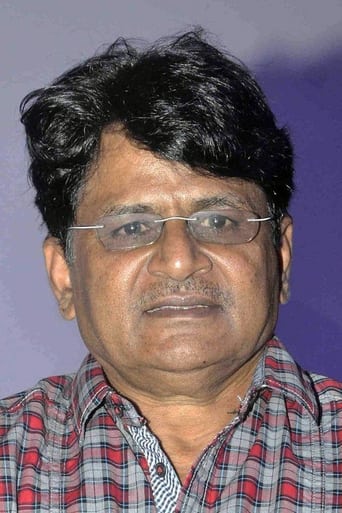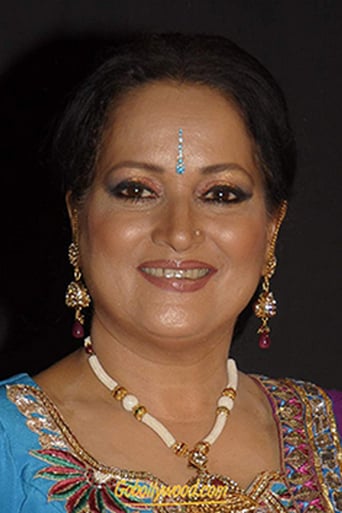A man shares some lazy memories about his friend, Manek Mulla, who had a knack for telling stories. On this particular afternoon, Manek narrates a 'unique' love affair with the help of different stories, various characters' point of views and the social relevance of these stories. As these stories proceed, reality mixes with fiction.
Reviews
So much average
I'll tell you why so serious
A lot of fun.
The story-telling is good with flashbacks.The film is both funny and heartbreaking. You smile in a scene and get a soulcrushing revelation in the next.
I was strolling through amazon prime archives for movies in Hindi language. After crap load of 8 page search, i came across an oddly titled movie i had never heard of. It immediately kept my attention as i excitingly saw the director, Shaam Benegal. I had heard of middle cinema but had never witnessed one. And for the next 2 hr and some 20 minutes, movie had my utmost attention. It was gem of a find and it kept me engrossed with its masterful direction, crafty storytelling and surrealistic layers of symbolism scattered all throughout.Movie is about 3 different stories entangled together at later stage. It amazingly captures same sequences through eyes of different subjects thus peeling of perspectives for same situation and scenes. It dwells into characters and suddenly comments through larger societal lens. And keeps on doing that for much of first half. For sure you would not have seen brutal realism of love stories as portrayed here. Narrative has no particular end, no moments of realization or take away but it flows on like life in general. Story itself is captivating enough. Our main protagonist is connected deeply with stories much later when we further learn how dicey human morals are, how we are mere product of our environment and act to maximize social gains from that environment. There is above all a surrealistic undertone, a detachment of sorts through out the movie. Characters are closely intertwined yet largely detached. And our protagonist is at forefront of this. Until of course the climax of movie hits us hard. And it tells us well that when the music is over, turn off the lights.
Suraj Ka Saatvaan Ghoda was directed by Shyam Benegal and it's based on the novel of same name written by Dharmveer Bharati. Main roles have been played by Rajit Kapoor, Amrish Puri, Neena Gupta, and Raghuveer Yadav. This is a unique story. If a great story becomes a foundation for a great movie, this is a most significant example of the same. This movie has many outlier features as an Indian movie. Before Memento (2001) I had not seen technique of showing a single scene from many perspectives, but this movie had many such scenes as early as in 1992 when it was made. The narration is multi-layered. The raconteur and prime-protagonist of movie is played by Rajit Kapoor and he has done this with a great degree of refinement. You cannot overlook the fact that theater experience of most of the actors of this movie made it possible to create such fine performances. Shyam Benegal's cast is perfect and I did not find any weaklings in the movie. The usage of regional-dialects in speech along with standard Hindi makes pinch of humor perfectly set in otherwise tragic socio-romantic melodrama. As said earlier, there are many layers to this drama. When one of the characters visits an art gallery, he recalls ( because of one of the paintings in the gallery ) the pastime discussions he used to have along with his other friends, in company of Manik Mulla; where Mulla used to tell them many stories and since Mulla was a literati, his views were considered eminent. In one such discussion, Mulla narrates a few most moving stories which are based primarily on his own romantic affairs and these stories are so interconnected and interwoven that he has to continue telling these until the second day. Inside his stories there are other narrations, making this story a multi-layered complex-threaded story. Mulla tells his listeners many stories which seem different but are interconnected because the same set of characters are present in each of the stories and apart from the social conditions affecting the characters of these stories there are love affairs which permeate from one story to other in an endless-shocking-melodramatic fashion. Mulla is not only the raconteur but also the hero of all of the stories and the witness perspective of all of the stories. There is at least one scene in each of the stories which connects to another scene in the previous story and in the last story the dark side of Mulla is revealed. In the end of the movie Mulla has to cope with what he had done. In spite of characterization of the father of the lover boy in first story as a womanizer, it's Mulla himself who is the most flirtatious character of all. In every story he is playing an escapist coward who flirts until in trouble.This movie is a masterpiece by Shyam Benegal because of his sensible direction and unique style of storytelling. The movie underscores the importance of great literature. The original story written by Dharmveer Bharati was a meta-fiction experiment in 1952.The movie is about Indian social structure and love-affairs getting affected because of lovers like Devdas (You cannot fail to observe mention of Devdas in more than one stories). It was an audacious story by the standards of Indian society of the decade in which it was created. I feel that nobody could have done justice with the role of Mulla more than Rajit Kapur and I think this movie is one of the greatest movies ever made in Indian cinema despite not being one of the most popular.
We, in Denmark, began daylight saving today – March 28, 2010. What this basically means is that our clocks will now be set to an hour ahead. It is curious how this day coincided with my viewing of Shyam Benegal's 'Suraj ka saatwa ghoda' (The seventh steed of the sun) last night. Based on a Hindi novella by the same name by Dr. Dharamvir Bharti's, the movie starts with Raghuvir Yadav introducing us to a few afternoons from his life where he knew a man called Manek Mulla (Rajit Kapur in his debut venture). Manek, we are told, was a master story-teller. A man who could blur out the distinct lines between reality and fiction purely by his talent at peppering his tales with metaphors aplenty. Working with the railways department, Manek had acquired the knack of keeping the three young men (of which Yadav is one too) occupied during lazy afternoons with his tales of love, deception, social imbalance and immorality within the lower middle classes of India.So, with this premise, a question is thrown – 'Should love stories be built at being relevant to the socio-economic growth of a society?' A bizarre, albeit thought-provoking, reference is made to the literary importance of 'Devdas' where, Manek says, there is no room for any sort of social relevance or optimism towards love as a public emotion. A definition, he claims, is what makes love so wonderful. Its lack of being a private, mysterious and almost forbidden concoction. So, in an effort to tell a tale of love lost connected with the complex fabric of social strata, he starts speaking of Jamuna. He speaks of how he was in school back then and Jamuna, the attractive next door girl, was in love with Tanna, another neighborhood fellow. Jamuna's and Tanna's love story was dated given the venomous relationships the two families shared due to lack of consistency in the Indian economic balance. As a result of this, Tanna is married off to a more educated Lily and Jamuna ends up with an old man knocking on the door of his grave.As you might have realized, there is nothing new or refreshing with this piece. What starts making this short story more interesting, is the way Manek describes his role in it and carefully begins to uncurl the tiny strands that were knotted during the narration of the aforementioned tale. For instance, the fact that Jamuna is unable to conceive from her old-man husband and so chooses to go on a bizarre religiously aligned but emotionally maligned detour with the tonga-wallah is brought to surface. Also, the fact that the girl Tanna ends up with – Lily – actually was Manek's love/friendship interest and how a mutual separation was finalized in both their interests is unearthed. Connected to this colorful mix as well, is the story of Tanna's lusty father (Amrish Puri in a truly memorable role as Mahesar Dalal) and his wile desires towards the lowly gypsy-woman Satti (Neena Gupta) who befriends Manek purely for his intellectual skills. Her eventual fate against an adamant Mahesar Dalal and the decisions young Manek makes form the twisting portions of the climactic sequences. All of these is documented from various angles aimed at the same scene. So, it isn't so much that Manek is narrating different short stories but essentially narrating just one story but from the perspectives of various characters in them. In some of them, the characters seem like the victims, while when seen from the view of another person's tale, the same character in the same scene will suddenly appear to have acquired some gray shades. Shades one would see in a predator. Truly – if a movie can accomplish this level of intellectual worth, then it has truly defined itself as the best example of cinema.What makes this movie greater in its worth is the fact that such a unique feat was written by Dr. Bharti in the 70s and narrated by Benegal in early 90s! Today we sit in awe at the intermingling of multiple stories in Hollywood and, of course, in their remade versions within Bollywood, and applaud them as being 'masterpieces'. But to compare this work to any of these would be nothing short of a huge disservice. In fact, I would call 'Suraj ka...' a work of meta fiction which successfully attempts to expose the fictional aspect of the illusive world woven by Manek Mulla.I also read some reviews that compared Manek's character to that of the holy trinity in Hindu mythology – Brahma, Vishnu and Maheshwar – and as to how he slips into these roles, albeit with varying degrees of subtlety. In the first tale with Jamuna, Manek is Brahma, the creator of a relationship that he knew was meant to be doomed. In the second tale with Lily, he became Vishnu, the preserver of her sanctity and an upholder of a more mature and practical relationship. In the final tale with Satti, he turned into the destroyer – Maheshwar – who ended up putting an end to what could have possibly been the redeeming factor of his life. I suppose it is in spectacular interpretations like these, that 'Suraj ka...' stands out as a truly unique piece of work.
The movie revolves around the romantic involvement of the protagonist -- Manik Mulla (brilliantly essayed by Rajit Kapur) with three women from different strata of India's social hierarchy: the lower-caste, the middle class, the intelligentsia. The movie is consequently laid out in three parts which are excellently woven together to form a wonderful story with lyrically humorous dialog and excellent performances. Shyam Benegal's direction is flawless and one can notice the characteristic complexities he infuses into his characters. Also, typical of Benegal, is the portrayal of the family co-existing synchronously with society and the protagonist in a perpetual surrealistic state of mind. The finale will leave you dazed and in awe of Benegal's story-telling prowess.
Top Streaming Movies











